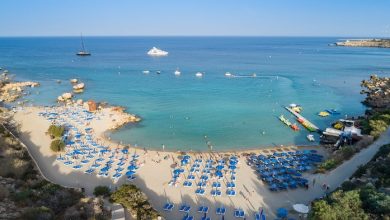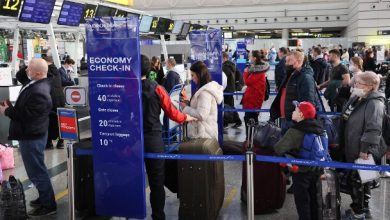
A new chapter of the investigation by the International Consortium of Investigative Journalists exposes how elites loyal to the Kremlin use opaque structures to do business and get around the sanctions they receive
A new chapter of Pandora Papers released today reveals unpublished details about offshore companies and other entities linked to allies of Vladimir Putin and other political actors in Russia, who protect their assets through opaque businesses and that allow them to evade global sanctions derived from the Russian invasion of Ukraine.
According to the new revelations of the International Consortium of Investigative Journalists (ICIJ) – of which Infobae for Argentina is a part -, more than 4,400 Russian citizens used 3,700 firms and entities located in jurisdictions considered tax havens. It is, by far, the nationality that appears the most in the leaked documents that make up the Pandora Papers, the investigation originally published in 2021.
Hundreds of Russian citizens have been sanctioned by the authorities of Western countries since Putin ordered the invasion of Ukraine. But efforts to identify and freeze the assets held by Putin’s first circle are bogged down on the shores of secrecy jurisdictions. Russian oligarchs, billionaires and bankers conduct business in places that reveal virtually no corporate information. Some companies are used to hide assets such as yachts and mansions. Others are used to pump money into schemes that end up in the pockets of President Vladimir Putin.
In the Pandora Papers, Russian politicians – including former ministers, former deputies and a former presidential candidate – were linked to 163 different entities. This number exceeds the offshore structures of politicians in any other country.
Aside from politicians, more than 45 oligarchs appear in the Pandora Papers data. There are from billionaires who run oil companies to criminals from the world of sports.
Russian political figures primarily use offshore firms Alcogal and Dadlaw, and most of their structures are registered in the British Virgin Islands and Cyprus, two secretive jurisdictions known for their low tax rates.
The new data, part of the massive leak that gave rise to the Pandora Papers investigation in 2021, comes from Alpha Consulting Ltd, a Seychelles-based service provider that provides “paper” directors, whose names appear on the documents. corporate documents to hide the identity of the real owners of the structures. 40% of more than 2,000 offshore corporations, foundations and trusts found in leaked Alpha Consulting data released today have one or more Russian beneficial owners. Another 23% have one or more Ukrainian beneficial owners.
According to data revealed by ICIJ, more than 800 members of the Russian elites loyal to the Kremlin used secret Alpha Consulting companies to hide their fortunes and circumvent sanctions from Western countries. Among them are at least 42 Russian billionaires whose combined wealth is equivalent to 15% of Russia’s gross domestic product. Of those tycoons, 11 have been targeted by the recent sanctions for the war in Ukraine.
Offshore clients include Putin’s former telecommunications minister, Leonid Reiman, singled out in a 2006 administrative investigation for controlling shares in the Russian telecommunications industry through an offshore structure. Also the billionaire oligarch Roman Avdeev, whom the US State Department identified as close to Putin in 2018, and who is listed as the beneficial owner of six offshore companies. Another client is Yuri Alexandrovich Pronyushkin, a municipal legislator, who is the owner of a company registered in Belize.
Pandora Papers contains information from 14 providers specialized in creating and operating companies, trusts and foundations in opaque jurisdictions, frequently used to hide assets and elude tax authorities. From the documents analyzed, it appears that Russian citizens control about 14% of all the companies and entities contained in the leak of 11.9 million confidential documents.
New revelations
Roman Avdeev started selling radio parts and TV decoders in the late 1980s. After the fall of the Soviet Union, at the end of 1991, he bought the Moscow Credit Bank, one of the country’s leading financial institutions. Today he owns a chain of pharmacies and has interests in the construction, wood and oil industries. He also bought the Moscow Torpedo soccer team in 2017. Forbes magazine estimates his fortune at $1.3 billion. The Moscow Credit Bank has been subject to US sanctions since last February.
Alpha Consulting documents show Avdeev offshore companies registered in Seychelles, the British Virgin Islands and Belize. One of them, Hi Capital Corp, appears as a personal savings company.
Leonid Reiman was appointed in 1999 Minister of Information and Communication of the Russian Federation. Later, he was appointed Minister of Information and Communication Technologies, and later advisor to the president.
In 2006, a Swiss arbitration panel found that he used an investment fund as a front to control interests in the Russian telecommunications industry while he was the sector’s minister, something Reiman denied. Years later, he was investigated for allegedly running a money laundering scheme with employees of a German bank. He has always denied any wrongdoing and has not been convicted.
Alpha Consulting documents show that the offshore companies connected to Reiman appear as securities trading companies.
The files also link offshore entities to Alexander Vinnik, a Russian computer expert. He worked as a cryptocurrency trader on the BTC-e platform until US authorities arrested him in Greece in 2017. He was extradited to France, where he was sentenced to five years in prison for money laundering. His defense expressed fear that his client would be extradited to the United States after completing her prison term.
Documents show that Alpha Consulting sent a report to Seychelles financial authorities in 2018, advising them that it had learned of the criminal charges against Vinnik during a due diligence review.
Mikail Gutseriev, founder of the Russian oil company RussNeft and a former member of the Duma -the chamber of legislators-, and his brother Sait-Salam Gutseriev, also a former legislator, are linked to 84 offshore companies created by Alcogal and Dadlaw. They are the Russian politicians who own the largest number of offshore companies in the Pandora Papers.
Russian oligarch Alexei Mordashov divested himself of his stake in the German tourism conglomerate TUI in February, shortly after the sanctions on almost 1,000 Russian citizens linked to the Kremlin were made public. He sold his third of the company to a company in the British Virgin Islands, one of the most opaque jurisdictions in the world.
The company, Ondero Ltd, would be the new shareholder of the Cyprus-based holding company with which Mordashov controls part of his investments in Europe. TUI thus seemed to disassociate itself from the sanctioned Russian. Ondero Ltd has been controlled since 2018 by Ranel Assets, a company linked to Marina Mordashova, mother of the tycoon’s children, as revealed by the leaked Pandora Papers documents.
In Pandora Papers also appears Suleiman Kerimov, a man from Putin’s circle of confidence. Financial and industrial with properties worth more than USD 9,800 million, according to the European Union, already appeared in the Panama Papers, a previous ICIJ investigation, for having received large sums of money from Sergei Roldugin, considered the custodian of the fortune of the Russian President .
In October 2013, the investment bank BNY Mellon identified wire transfers of more than USD 270 million from a shell company in Cyprus to SH Advisors Limited, a company in the Cayman Islands. The bank failed to correctly identify the beneficiary of the company. But files from the Trident Trust study reveal that SH Advisors Limited was owned by Heritage XXI Holding Ltd, a shell company in the British Virgin Islands. Heritage is owned by the Suleiman Kerimov Foundation, a Swiss registered charity.
A year later, the same bank reported millions of dollars in payments to LT Trading, which mistakenly associated a British entity with the same name. ICIJ’s investigation reveals that the company, from the Virgin Islands, is linked to Nariman Gadzhiev, Kerimov’s nephew known to have worked with him. Through Swiss bank Credit Suisse, the company secured a $67 million loan to purchase two aircraft: a custom-built Boeing 737 Business Jet and a Bombardier Global Express.
The offshore hideout of eight bankers
The Russian financial system has been one of the main targets of sanctions by European countries. But some bankers in that country had already sought to reduce the impact of these measures on their personal finances. The new installment of Pandora Papers reveals that, over the last decade, eight executives in the largest Russian banks – the sanctioned Alfa Bank, VTB and VEB, as well as Gazprombank and Sberbank – have taken advantage of the secrecy offered by the offshore financial world to hide assets in jurisdictions far from Russia.
Andrey Akimov, from Gazprombank; Yuri Solivev, from VTB; and VEB’s Igor Shuvalov used opaque companies to invest in luxury villas in London and Cyprus. Herman Gref, CEO of Sberbank, Russia’s largest bank, used an offshore network in Singapore in 2015 to reorganize $75 million from a family trust.
Peter Eve, German Khan, Alexey Kuzmichev and Mikhail Fridman, the founders and owners of Alfa Bank, are the four ultimate beneficiaries of a group of companies that control at least USD 1.8 trillion in assets, allegedly used for “operations with financial instruments ”. Alfa Bank, the largest entity not directly controlled by the Kremlin, was sanctioned in February by the United States and the European Union, which claim that the four managers have “a close relationship” with Putin. The Russian president, according to the EU, “compensated for Alfa Group’s loyalty to the Russian authorities by offering political aid to their investment plans abroad.”
Pandora Papers now reveals that the four, who have had ties to offshore companies since the early 1990s, transferred to a “nominal shareholder” in Cyprus the shares of that shell company that they used for “consulting” and “operations with financial instruments” that accumulated $1.8 trillion in assets. The operation, carried out in 2014 after Russia annexed the Crimean peninsula with the consequent round of Western sanctions, allowed that shareholder to appear as the sole real owner in public documents. The company, based in the Virgin Islands, was dissolved in 2019.
Contacted by ICIJ, Shuvalov and Aven have denied any illegalities in their operations. Fridman, for his part, has been one of the first oligarchs to openly oppose the invasion of Ukraine. The rest of the bankers did not answer the questions.
Offshore Leaks Base Expanded
The data from Alpha Consulting adds to the information on Russia’s elites already contained in ICIJ’s Offshore Leaks database, which is publicly available. This expansion published today by the Consortium now includes more than 800,000 companies, foundations and offshore trusts, and links to individuals and companies in more than 200 countries and territories, in total. Among them, more than 11,000 have ties to Russia.
Contains data from five leaks: Offshore Leaks, Panama Papers, Bahamas Leaks, Paradise Papers and Pandora Papers. ICIJ does not mass publish raw documents, whether corporate or personal, but rather structured information about company owners, frontmen and intermediaries in secrecy jurisdictions, not including private communications, banking information or private personal documents.



